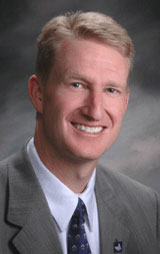Radicalization of American Politics Likely to Continue
 |
|
Kirk Jowers, Director |
It appears Republicans are poised to make significant gains in a year teeming with immense political change and polarization. Kirk Jowers, Director of the Hinckley Institute of Politics at the University of Utah, commented in a recent interview that people are angry at Washington and Congress in particular. After just four years of enjoying control, the Democrats are going to receive the brunt of that anger even as disapproval ratings for both parties are dipping below 30 percent.
“We’re in a really volatile time in American history and the economy exacerbates everything,” says Jowers. “In 2006 and 2008 Republicans were in power and the anger in the middle went against the Republicans and allowed Democrats to make significant gains in states, in the Senate and the House. What we’re seeing now is the anger reversed because the Democrats have all the power for the moment. And you look at the independents, they have flocked away from the Democratic Party in the last eight months and they’re going to fuel massive Republican gains.”
When asked if he thinks Congress will swing away from Democrats, Jowers responded, “I do. Republicans will take the House but the question is by how much. I think the Democrats hold the Senate but very narrowly. I think Republicans will pick up seven or eight gubernatorial seats which is significant this year because we have the census and redistricting coming. The effects of this are going to be long lasting because Republicans will have more control in the state houses during this crucial census year where they can help define boundaries and who’s elected for the next decade.”
The aforementioned polarization that’s affecting the Democratic and Republican parties is causing a radicalization of both parties. Many Democrats are vying for reelection by distancing themselves from the President while on the Republican side we have a new radical movement in the form of the Tea Party. And with so much radicalization the average voter seems to just be opting out to vote.
“That’s the sad thing,” says Jowers, “ that there’s a huge vacuum so I think a lot of people’s voices just aren’t being heard; it’s causing a radicalization of both parties, it’s causing more of an inability for people to work together which is a horrible, vicious circle and we aren’t solving any of our problems which makes people more disaffected, which makes people vote less, which creates a bigger vacuum, which allows more radicals on either side to get engaged and just completes this cycle.” And according to Jowers this trend may continue for years to come as social media and other facets isolate people from one another and other moderate points of view, which may in turn affect President Obama’s chances in 2012.
Even though things look bleak for President Obama he can at least draw on the model set by former President Clinton when Republicans gained advantages in Congress in the ’94 and ’96 elections and he was able to work with them and share the blame. However, with the volatility of the political climate right now we’ll have to wait until 2012 to see if this Republican momentum remains constant and whether President Obama can capitalize on it or not.
There are also some key races to keep an eye on locally. “The closest local election will probably be the Congressional race between incumbent Jim Matheson (D) and Morgan Philpot (R), but I think Matheson will still win by double digits,” says Jowers, “and at this moment I think it will be about a 20 point win for Herbert in the gubernatorial race.” Governor Gary R. Herbert (R), who has undergone scrutiny for receiving money from the winning bidder of the UDOT program in Utah County, maintains a strong lead. “Herbert had a 25 point lead and [Mayor Peter Corroon (D)] needed to soften up that lead,” says Jowers. “Where he made his error is he didn’t turn and start putting out ads why he should be governor and maybe Herbert shouldn’t be governor.” It’s likely Corroon will only take Salt Lake County.
Be sure to keep an eye on the Hinckley Institute’s calendar for upcoming election and post-election events by clicking here.
By: Jacob M. Stout
